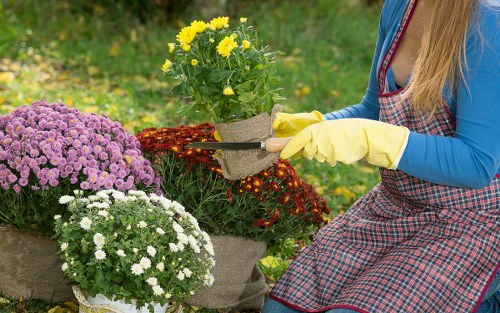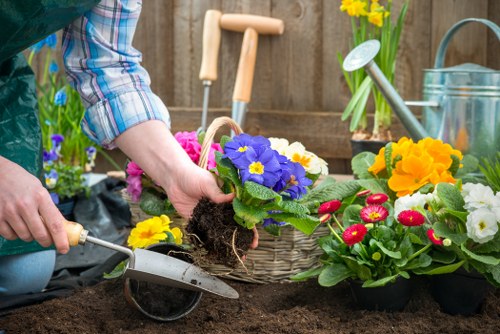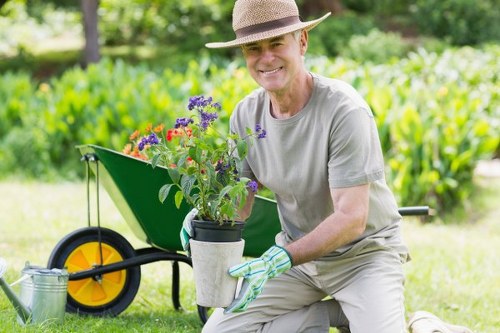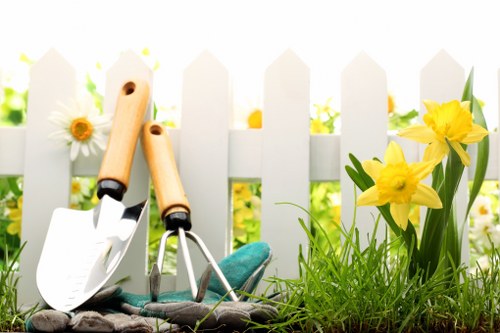Comprehensive Guide to Garden Maintenance in Cleaners EN5
Introduction to Garden Maintenance

Maintaining a beautiful garden requires regular care and attention. In Cleaners EN5, garden maintenance is not just about keeping plants healthy but also about enhancing the overall aesthetics of your outdoor space. Whether you're a seasoned gardener or a beginner, understanding the fundamentals of garden maintenance can help you achieve a thriving and picturesque garden.
Garden maintenance involves a variety of tasks including planting, pruning, weeding, and ensuring proper soil health. Each of these tasks plays a crucial role in the growth and sustainability of your garden. By following a consistent maintenance schedule, you can prevent common garden problems and ensure that your plants flourish throughout the seasons.
In Cleaners EN5, the climate and soil conditions present unique challenges and opportunities for gardeners. It's important to tailor your maintenance practices to suit these local conditions, ensuring that your garden remains vibrant and resilient against environmental factors.
Essential Garden Maintenance Tasks

Effective garden maintenance encompasses several key tasks that together create a healthy and attractive garden environment.
1. Pruning: Regular pruning helps in removing dead or diseased branches, promoting new growth, and maintaining the desired shape of your plants. Proper pruning techniques can enhance plant health and flowering.
2. Weeding: Weeds compete with your plants for nutrients, water, and sunlight. Consistently removing weeds is essential to prevent them from overtaking your garden and to reduce the need for chemical herbicides.
Soil Health and Fertilization

Healthy soil is the foundation of a thriving garden. Good soil structure ensures proper drainage, aeration, and nutrient availability for plants.
Soil Testing: Regularly testing your soil helps in understanding its pH levels, nutrient content, and organic matter. This information is crucial for making informed decisions about fertilization and soil amendments.
Composting: Composting organic waste adds valuable nutrients to your soil, improves its texture, and promotes beneficial microbial activity. Incorporating compost into your garden beds enhances soil fertility and structure.
Plant Selection and Care

Choosing the right plants for your garden is vital for its success. Consider factors such as climate, soil type, sunlight, and water availability when selecting plants.
Native Plants: Incorporating native plants that are well-adapted to the local environment can reduce maintenance efforts and increase resilience against pests and diseases.
Watering: Proper watering practices are essential. Overwatering can lead to root rot, while underwatering can stress plants. It's important to establish a watering routine that meets the specific needs of each plant species.
Pest and Disease Management

Protecting your garden from pests and diseases is a critical aspect of maintenance. Implementing integrated pest management (IPM) strategies can help in effectively controlling unwanted pests.
Identification: Early detection of pests and diseases allows for swift action, minimizing damage to your plants.
Natural Remedies: Utilizing natural predators, organic pesticides, and environmentally friendly treatments can manage pest populations without harming beneficial insects or the ecosystem.
Seasonal Maintenance Tips
Adapting your maintenance practices to the changing seasons ensures that your garden remains healthy year-round.
Spring: Focus on planting new seeds, preparing soil beds, and pruning early bloomers. This is also the time to apply fertilizers to support new growth.
Summer: Regular watering, mulching, and pest control are essential to cope with the heat. Deadheading flowers can encourage continuous blooming.
Tools and Equipment for Garden Maintenance
Having the right tools can make garden maintenance tasks easier and more efficient.
- Pruners: Essential for trimming and shaping plants.
- Hoes: Useful for weeding and cultivating soil.
- Garden Fork: Ideal for aerating soil and turning compost.
- Watering Can or Hose: Provides a reliable source of water for plants.
- Wheelbarrow: Helps in transporting soil, plants, and tools.
Investing in high-quality tools not only enhances the efficiency of maintenance tasks but also ensures durability and ease of use over time.
Creating a Maintenance Schedule
Establishing a regular maintenance schedule helps in staying organized and ensuring that all necessary tasks are completed on time.
- Daily: Inspect plants for signs of stress or pests, water as needed.
- Weekly: Weed garden beds, check soil moisture levels, prune as necessary.
- Monthly: Fertilize plants, test soil pH, clean and organize tools.
- Seasonally: Perform deep soil amendments, prepare plants for seasonal changes, and plan for new plantings.
Adhering to a structured schedule ensures that your garden receives consistent care, leading to healthier plants and a more beautiful outdoor space.
Benefits of Professional Garden Maintenance
While DIY garden maintenance can be fulfilling, hiring professional services in Cleaners EN5 offers several advantages.
Expertise: Professional gardeners have the knowledge and experience to handle complex maintenance tasks, ensuring optimal plant health and garden aesthetics.
Time-Saving: Outsourcing maintenance tasks frees up your time, allowing you to enjoy your garden without the stress of upkeep.
Environmentally Friendly Practices
Adopting sustainable gardening practices benefits both your garden and the environment.
- Composting: Reduces waste and enriches soil.
- Rainwater Harvesting: Conserves water and provides a natural irrigation source.
- Organic Fertilizers: Promote soil health without harmful chemicals.
- Native Planting: Supports local biodiversity and reduces maintenance needs.
- Mulching: Retains soil moisture and suppresses weed growth.
Implementing these practices creates a sustainable garden that thrives harmoniously with nature.
Common Garden Problems and Solutions
Addressing common garden issues promptly can prevent them from escalating and harming your plants.
Pest Infestations: Identify the type of pest and use appropriate control methods, such as organic pesticides or introducing beneficial insects.
Diseases: Remove affected plant parts, improve air circulation, and use disease-resistant plant varieties.
Enhancing Garden Aesthetics
A visually appealing garden not only boosts your home's curb appeal but also provides a serene space for relaxation.
Plant Arrangement: Arrange plants in layers with varying heights and colors to create depth and interest.
Hardscaping: Incorporate elements like pathways, benches, and water features to add structure and functionality to your garden.
Lighting and Irrigation Systems
Proper lighting and irrigation are key components of a well-maintained garden.
Lighting: Install ambient lighting to highlight garden features and provide safety during evening hours.
Irrigation: Automated irrigation systems ensure consistent watering, reducing manual effort and conserving water.
Seasonal Planting Strategies
Strategic planting based on seasons ensures that your garden remains colorful and productive throughout the year.
- Spring: Plant annuals and perennials that thrive in cooler temperatures.
- Summer: Focus on heat-resistant plants and those that provide shade.
- Autumn: Plant bulbs for spring blooming and prepare plants for the colder months.
- Winter: Maintain evergreen plants and protect vulnerable species from frost.
Understanding the seasonal needs of your garden helps in planning and executing effective maintenance tasks.
Gardening Tips for Beginners
Starting a garden can be overwhelming, but with the right approach, anyone can create a thriving outdoor space.
Start Small: Begin with a manageable garden size and gradually expand as you gain experience.
Learn About Your Plants: Research the specific needs of each plant species to ensure proper care.
Stay Consistent: Regular maintenance is key to preventing issues and promoting healthy growth.
Advanced Garden Maintenance Techniques
For experienced gardeners, advanced techniques can further enhance garden health and productivity.
Crop Rotation: Changing the location of plant families each season prevents soil depletion and reduces pest buildup.
Companion Planting: Growing compatible plants together can improve growth rates and deter pests.
Conclusion
Effective garden maintenance in Cleaners EN5 requires a combination of knowledge, regular care, and strategic planning. By understanding the essential tasks and implementing sustainable practices, you can create and maintain a beautiful and healthy garden that stands the test of time.
Whether you choose to maintain your garden yourself or enlist professional services, the key is to stay consistent and attentive to your garden's needs. Embrace the joy of gardening and enjoy the rewards of your hard work and dedication.
Ready to transform your garden? Contact us today to book your garden maintenance service and let our experts help you achieve the garden of your dreams.


